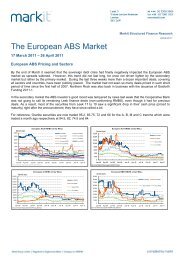The CDS Big Bang Research Report - Markit.com
The CDS Big Bang Research Report - Markit.com
The CDS Big Bang Research Report - Markit.com
Create successful ePaper yourself
Turn your PDF publications into a flip-book with our unique Google optimized e-Paper software.
<strong>CDS</strong> <strong>Big</strong> <strong>Bang</strong>: Contract and Convention Changes<br />
<strong>The</strong> industry’s <strong>com</strong>mitments and progress have been <strong>com</strong>municated through a series of letters to the FRB and via<br />
<strong>Markit</strong> Metrics, which was established as the result of the first meeting of the Fed 14. <strong>Markit</strong> Metrics is a tool that is<br />
designed to allow regulators and dealers to track key operational milestones achieved by industry participants.<br />
Although there have been several regulatory statements in North America concerning the <strong>CDS</strong> market, the President’s<br />
Working Group’s (PWG) March 2008 “Policy Statement on Financial Markets” was among the most influential. <strong>The</strong><br />
PWG was originally established by President Ronald Reagan to study and respond to the market conditions of “Black<br />
Monday” in October 1987. <strong>The</strong> PWG consists of the Secretary of the Treasury (as Chairman), the Chairman of the<br />
Board of Governors of the Federal Reserve System, the Chairman of the Securities and Exchange Commission, and the<br />
Chairman of the Commodity Futures Trading Commission. In the March 2008 statement, the PWG outlined their<br />
diagnosis of the causes of the recent financial market turmoil. <strong>The</strong>y cited loosening of lending standards, inadequate<br />
risk systems, residential mortgage backed securities, and weaknesses at the rating agencies as the significant drivers.<br />
<strong>The</strong> document also makes some re<strong>com</strong>mendations for the over-the-counter (OTC) derivatives markets, which includes<br />
the credit default swaps market. Specifically the PWG re<strong>com</strong>mended the following:<br />
1. More ambitious standards for timely trade matching. A desire for T+0 or same day trade matching is behind<br />
many of the <strong>CDS</strong> changes discussed in this report.<br />
2. Amend trade documentation to include provisions for cash settlement of credit events. Currently participants in<br />
the <strong>CDS</strong> market that wish to participate in the auction, used for cash as well as physical settlement of <strong>CDS</strong><br />
positions, must sign a separate protocol for each credit event.<br />
3. Provide a foundation for industry-wide, operational infrastructure changes that maximize automation and<br />
electronic processing, and reduce counterparty risk via trade <strong>com</strong>pression and collateral arrangements.<br />
In Europe, similar conversations have been occurring in parallel with the discussions in the US around infrastructure<br />
enhancements to the <strong>CDS</strong> market. Most of these conversations have occurred primarily through the European<br />
Commission, although regulators in several jurisdictions have been involved on other matters particularly as they relate<br />
to the banking systems of their respective countries. Most recently, nine of the major European <strong>CDS</strong> dealers and the<br />
European Commission <strong>com</strong>mitted to introducing central clearing by the end of 2009. A description of central clearing is<br />
provided later in this report.<br />
In terms of specific changes to the <strong>CDS</strong> product for the European region, it is still too early to fully know all of the<br />
possible changes that will occur. We do know that European contracts will be subject to the global contract changes<br />
enumerated here in detail, specifically: hardwiring of the auction protocol, event determination <strong>com</strong>mittees, and<br />
standardized event effective dates. We can predict that Europe will likely not adopt the dropping of restructuring from its<br />
contracts simply due to the need by clients in the European region stemming from differing bankruptcy procedures<br />
across different regimes and a greater focus on Basel II capital relief.<br />
Benefits of Changes to Trade Compression<br />
<strong>The</strong> purpose behind <strong>com</strong>pression is to reduce <strong>CDS</strong> gross notional amounts outstanding while not altering the economic<br />
details of a party’s net position. Reducing the number of outstanding trades is also a key aim. In order to not alter the<br />
economic details of a net position, one has to replicate the same risk profile and cash flows for each trade. Additionally,<br />
any <strong>com</strong>pression process also has to take into consideration each bank’s credit limits to counterparties.<br />
<strong>The</strong> <strong>CDS</strong> <strong>com</strong>pression process jointly developed by <strong>Markit</strong> and Creditex involves terminating existing trades and<br />
replacing them with a far fewer number of new “replacement trades” which have the same risk profile and cash flows as<br />
the initial portfolio. <strong>The</strong> initiative, available to both the U.S. and European <strong>CDS</strong> markets, has the support of 16 major<br />
<strong>CDS</strong> market dealers. <strong>Markit</strong> and Creditex were awarded the administration of the portfolio <strong>com</strong>pression process in the<br />
summer of 2008. Since then, over $ 2 trillion notional value has been reduced for single name trades with no change in<br />
actual value. <strong>The</strong> process recreates the cash flow and risk position of each counterparty with a smaller notional amount<br />
and number of trades. Benefits are a decrease in operational risk, smaller capital charged (as they apply to gross<br />
notional amount), and improved operational costs (each trade costs money to maintain). <strong>The</strong> success of this service has<br />
been credited in part with helping continue the trend of reducing the overall notional volume in the <strong>CDS</strong> market.<br />
Confidential. Copyright © 2009, <strong>Markit</strong> Group Limited. All rights reserved. www.markit.<strong>com</strong><br />
5








